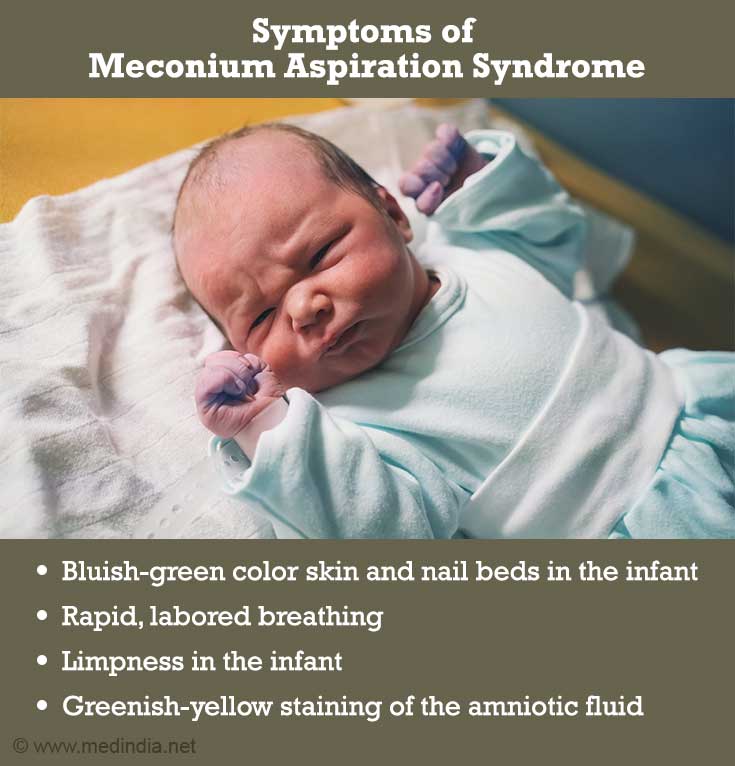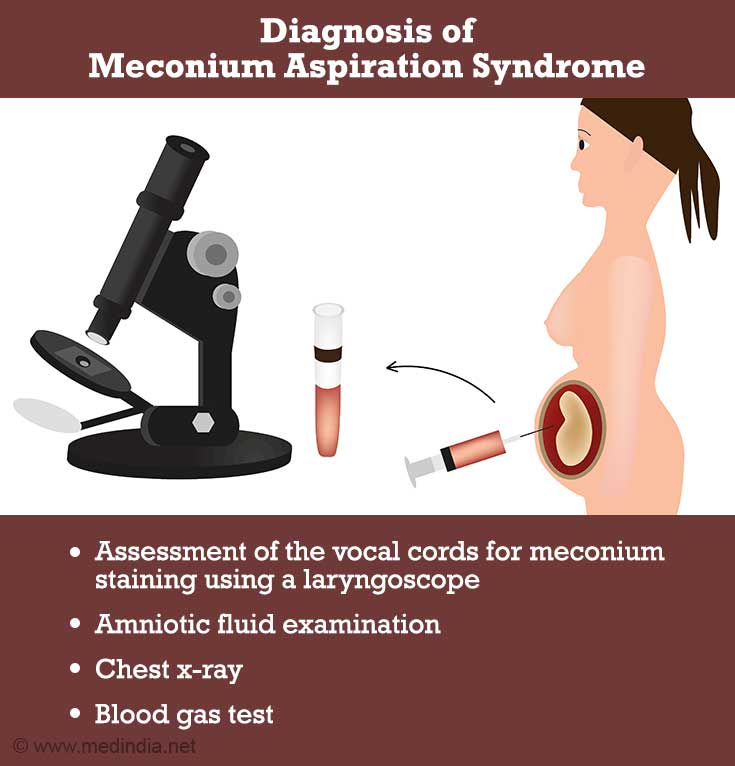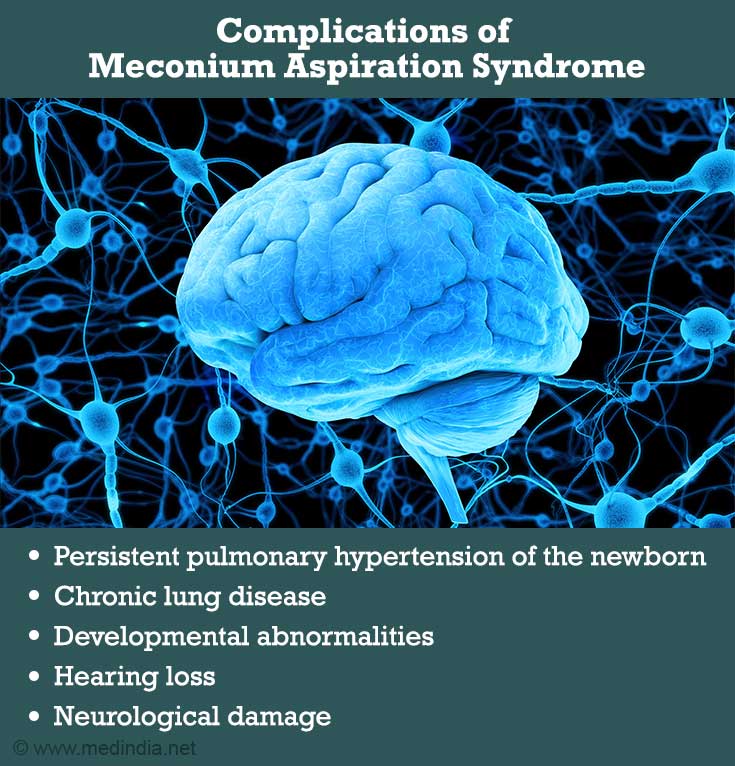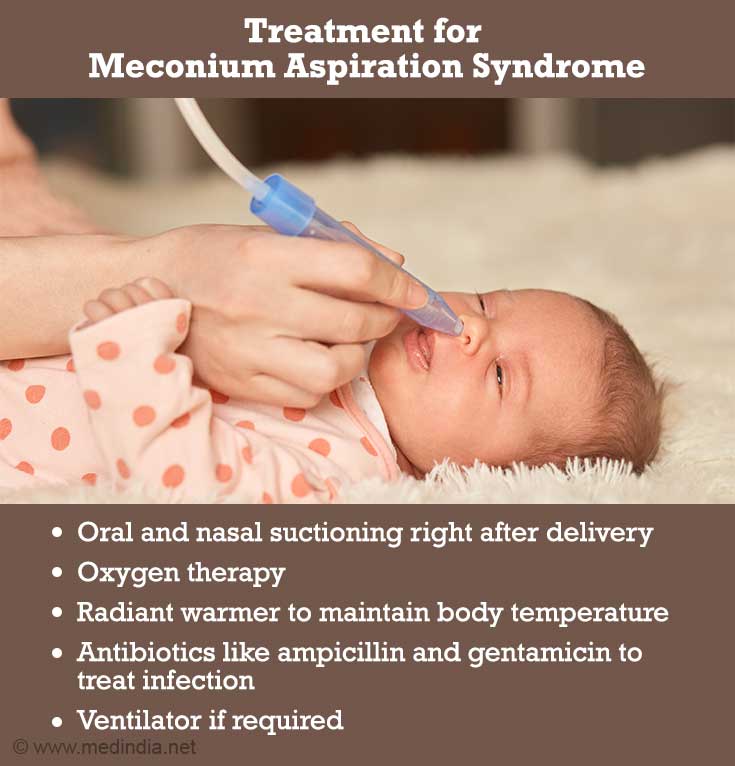- Meconium aspiration syndrome - (http://en.wikipedia.org/wiki/meconium_aspiration_syndrome)
- Persistent Pulmonary Hypertension of the Newborn (PPHN) - (http://www.nationwidechildrens.org/persistent-pulmonary-hypertension-of-the-newborn)
- Information About Meconium Aspiration Syndrome - (http://www.birthinjuryguide.org/birth-injury/types/meconium-aspiration-syndrome/)
- Meconium Aspiration - (http://kidshealth.org/parent/medical/lungs/meconium.html)
- About Meconium aspiration syndrome - (http://www.nlm.nih.gov/medlineplus/ency/article/001596.htm)
What is Meconium Aspiration Syndrome?
Meconium Aspiration Syndrome is a condition in which the new born baby develops respiratory distress due to inhalation of meconium and amniotic fluid. Meconium is the first stool of the new born which is usually eliminated after birth. But in case of Meconium Aspiration Syndrome, meconium is excreted before or during birth due to stress or hypoxia in the baby. Amniotic fluid is the fluid that surrounds the baby in the womb during pregnancy.
The mechanism causing Meconium Aspiration Syndrome is by three pathways. They are blockage of the newborn’s airways with meconium followed by chemical irritation and inflammation in the airways and lastly inactivation of surfactant. Surfactant is the natural substance produced in the lungs which helps their expansion.
What Causes Meconium Aspiration Syndrome?
Meconium Aspiration Syndrome occurs due to excretion of the meconium before or during delivery, which is breathed into the lungs of the newborn causing symptoms of respiratory distress. Elimination of meconium into the amniotic fluid before birth occurs as a result of fetal distress or hypoxia.
Conditions which increase the risk of developing Meconium Aspiration Syndrome are:
- Advanced gestational age
- Gestational diabetes in the pregnant mother
- High blood pressure in the pregnant mother
- Chronic respiratory conditions in the pregnant mother
- Cardiovascular conditions in the pregnant mother
- Prolonged labor / difficult delivery
- Reduced blood/ oxygen supply to the infant while in the uterus
- Abnormalities of the umbilical cord
- Poor growth of the fetus in the womb.
What are the Symptoms of Meconium Aspiration Syndrome?
Common symptoms of Meconium Aspiration Syndrome are:
- Bluish green color skin and nail beds in the infant

- Rapid, labored breathing
- Limpness in the infant
- Greenish yellow staining of the amniotic fluid
How to Diagnose Meconium Aspiration Syndrome?
Physical examination of the newborn is the key to diagnosis in Meconium Aspiration Syndrome. Before birth fetal monitoring may show reduced heart rate. Physical examination at birth shows rapid labored breathing or no breathing, slow heartbeat, barrel shaped chest and low Apgar score. Auscultation of the chest reveals coarse, crackling sounds.
Examination with a laryngoscope can reveal meconium staining on the vocal cords in case of suspected Meconium Aspiration Syndrome.
A blood gas analysis is ordered which shows hypoxemia and acidic blood pH (low oxygen and raised carbon dioxide levels on the blood). Serum electrolytes are also checked to evaluate the metabolic status.
A chest X- ray reveals patchy/ streaky areas in the lungs.
Amniotic fluid examination can show meconium in the amniotic fluid or greenish yellow staining of the amniotic fluid due to meconium in it.

What are the Complications of Meconium Aspiration Syndrome?
- Persistent Pulmonary Hypertension of the Newborn – This is a condition in which the newborn fails to shift from fetal circulation (in the uterus) to normal newborn circulation after birth. In this condition due to high blood pressure in the arteries of the lungs, blood is forced away from the lungs, hence causing decreased oxygen supply to the body.
- Chronic Lung Disease – Asthma, interstitial emphysema, cystic lung disease, pneumothorax, pneumomediastinum.
- Developmental Abnormalities – Severely affected babies can develop abnormalities like bronchopulmonary dysplasia, cerebral palsy, seizures and hypoxic brain damage.

- Hearing Loss
- Neurological Damage
What are the Treatment for Meconium Aspiration Syndrome?
Treatment of Meconium Aspiration Syndrome depends upon newborn condition and the presence of respiratory distress. In case, of mild meconium aspiration only observation of the newborn for signs of respiratory distress is done. If the newborn has severe meconium aspiration, the following measures should be followed:
- Oral and nasal suctioning right after delivery

- Breathing support with oxygen via nasal prongs or, if required, mechanical ventilation
- In case of failure of response with the above measures, Extra Corporeal Membrane Oxygenation (ECMO) is considered (an artificial heart and lung machine to support the oxygentaed blood delivery to the newborn)
- Antibiotics to combat infection (ampicillin and gentamycin)
- IV access to support nutritional requirements
- Warmers to maintain the normal body temperature of the newborn
Prevention of Meconium Aspiration Syndrome
The following are the measures to prevent Meconium Aspiration Syndrome or reduce its severity:
- Antenatal monitoring of the fetus and placenta in post-maturity births
- Intrapartum suctioning (suctioning during labor immediately when the head is delivered)
- Tracheal intubation and suctioning in severe respiratory distress.
Health Tips
- Regular antenatal checkups with fetal heart rate monitoring (especially in overdue births).
- Maintaining optimal weight in pregnancy, tight control of gestational diabetes and management of hypertension.
- Adequate physical activity should be practiced, if no contraindications are present.
- Inform your doctor about your previous medical and drug history.








